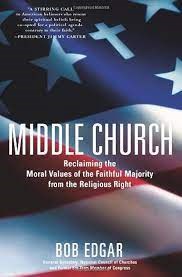
Middle Church: Reclaiming the Moral Values of the Faithful Majority from the Religious Right
by Bob Edgar
© 2006
Bob Edgar, general secretary of the National Council of the Churches of Christ in the USA (the leading U.S. organization in the movement for Christian unity) is an ordained elder in the United Methodist Church – and the author of this book. He has been a pastor, teacher, college chaplain, Claremont School of Theology president, and six-term member of the U.S. House of Representative from the Seventh District of Pennsylvania. Edgar contends that the radical religious right has placed the wrong issues (opposition to gay marriage, abortion, and stem-cell research) at the forefront of the moral agenda for America. The moral issues that are central to America’s faithful majority (Middle Church) are peace, poverty, and planet Earth. Middle Church is the place where people of faith – Christians, Jews, Muslims – can come together and replace tolerance, social justice, and love at the top of our country’s political agenda.